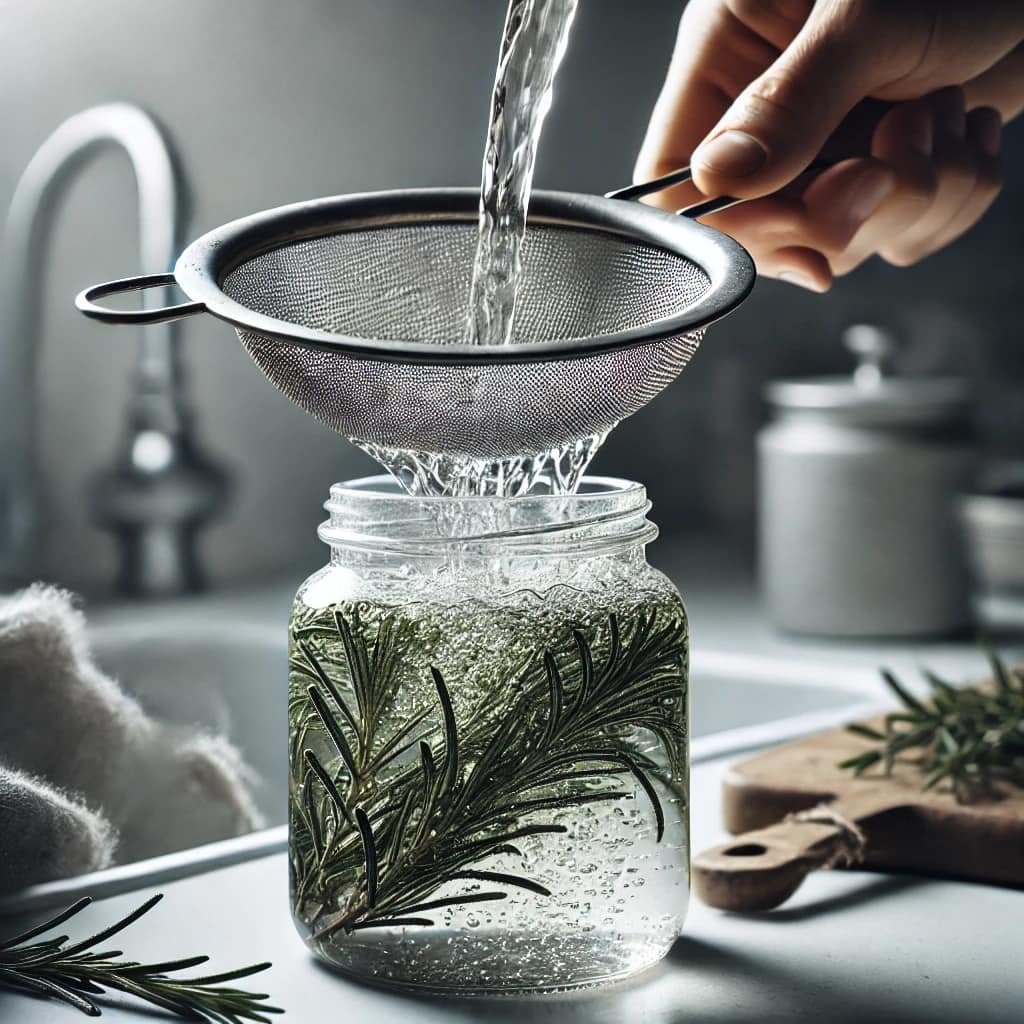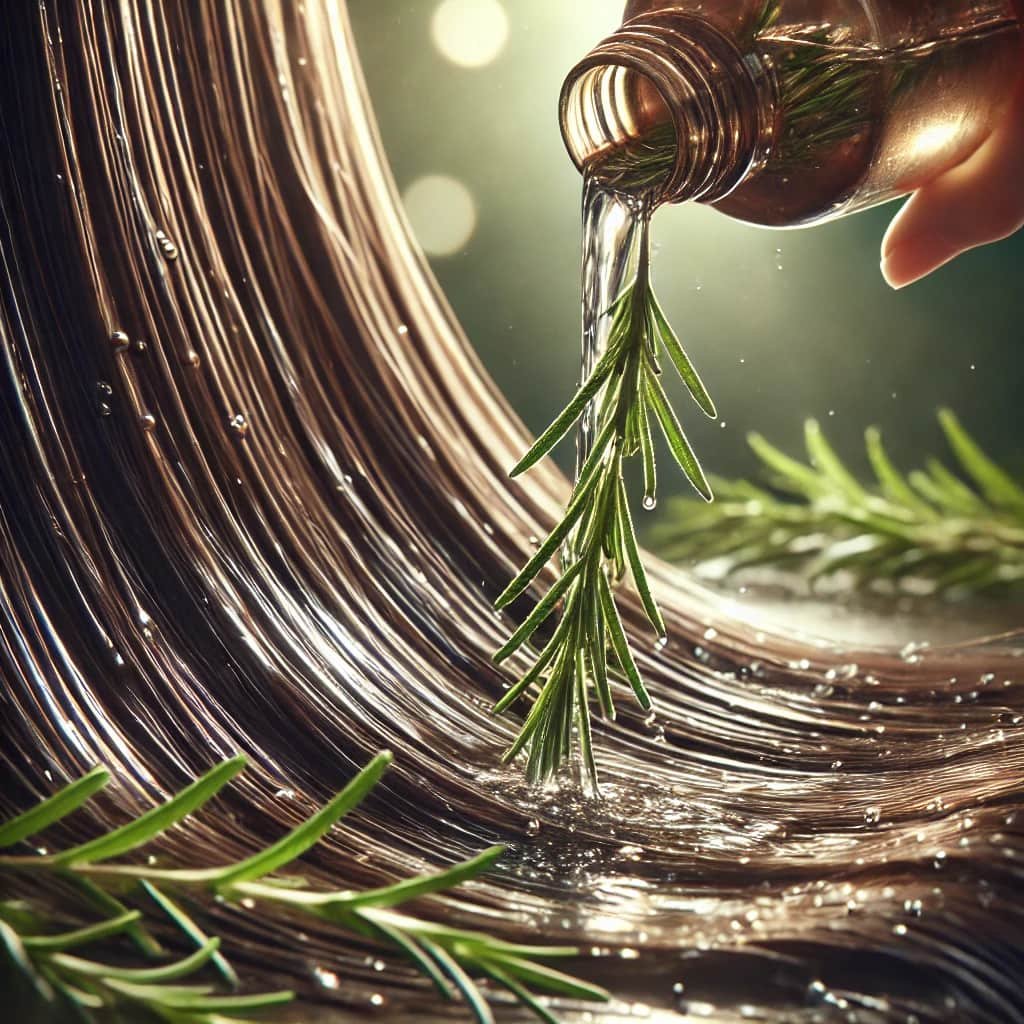Taking care of your hair naturally has never been more popular. With the rise of DIY beauty remedies, rosemary water has emerged as a star player in the world of hair care. Whether you’re looking to boost hair growth, add shine, or tackle dandruff, rosemary water might just be your new go-to. In this article, we’ll dive into everything you need to know about making and using rosemary water for your hair.

What is Rosemary Water?
Rosemary water is a simple infusion made from rosemary leaves and water. Rosemary, a fragrant herb known for its medicinal properties, has been used for centuries in cooking, medicine, and now, hair care. When steeped in hot water, the natural oils and nutrients in rosemary are released, creating a powerful tonic that can be used on your hair.
Benefits of Rosemary Water for Hair
Promotes Hair Growth
One of the most celebrated benefits of rosemary water is its ability to promote hair growth. The herb is rich in antioxidants and nutrients that stimulate blood circulation in the scalp, encouraging hair follicles to grow.
Reduces Dandruff and Scalp Irritation
If you struggle with dandruff or an itchy scalp, rosemary water could be your solution. Its anti-inflammatory and antimicrobial properties help to soothe irritation and keep your scalp healthy.
Enhances Hair Shine
Who doesn’t love shiny hair? Rosemary water can add a natural luster to your locks by sealing in moisture and smoothing the hair cuticles, leaving you with a glossy finish.
Why Choose Rosemary Water Over Commercial Products?
Natural Ingredients vs. Chemical-Laden Products
Unlike many commercial hair care products that contain harsh chemicals, rosemary water is entirely natural. This means you’re less likely to experience side effects or damage to your hair.
Cost-Effectiveness and Sustainability
Making rosemary water at home is not only budget-friendly but also environmentally sustainable. You can create your own hair tonic without contributing to plastic waste or spending a fortune on salon treatments.
Ingredients You’ll Need
To make rosemary water, you’ll need just a few simple ingredients:
- Fresh or dried rosemary: Both work well, so use what you have on hand.
- Water: The base for your infusion.
- Optional: Essential oils (like lavender or peppermint) or apple cider vinegar for added benefits.
Step-by-Step Guide to Making Rosemary Water

Step 1: Preparing the Rosemary
Start by rinsing the rosemary under cold water to remove any dirt or debris. If you’re using fresh rosemary, strip the leaves from the stems.
Step 2: Boiling the Water
Bring a pot of water to a boil. You’ll need about 2 cups of water for every 3-4 sprigs of rosemary.
Step 3: Infusing the Rosemary
Once the water is boiling, add the rosemary to the pot. Reduce the heat and let it simmer for 15-20 minutes. The longer you let it steep, the more potent your rosemary water will be.
Step 4: Cooling and Straining the Mixture
After simmering, remove the pot from heat and let the mixture cool. Once cooled, strain out the rosemary leaves, leaving you with a fragrant, amber-colored liquid.
Step 5: Storing the Rosemary Water
Pour the rosemary water into a clean, airtight container. You can store it in the refrigerator for up to two weeks.
How to Use Rosemary Water on Your Hair

Daily Rinse
Use rosemary water as a final rinse after shampooing your hair. Pour it over your scalp and hair, then massage it in. Leave it on for a few minutes before rinsing with cool water.
Scalp Massage
For an extra boost, use rosemary water during a scalp massage. Dip your fingertips in the water and gently massage your scalp to stimulate circulation.
Leave-In Conditioner
You can also use rosemary water as a leave-in conditioner. Spray it onto damp hair and style as usual, or apply it to dry hair for a midday refresh.
Tips for Enhancing the Effectiveness of Rosemary Water
Combining with Other Natural Ingredients
To enhance the benefits of rosemary water, consider combining it with other natural ingredients like aloe vera, coconut oil, or honey. These additions can provide extra moisture and nourishment.
Adjusting the Formula for Different Hair Types
If you have oily hair, you might want to add a few drops of apple cider vinegar to your rosemary water. For dry or damaged hair, a few drops of argan oil can help to lock in moisture.
Potential Side Effects and Precautions
Allergic Reactions
While rosemary water is generally safe, some people may experience allergic reactions. Always do a patch test before applying it to your entire scalp.
Proper Usage and Avoiding Overuse
It’s important to use rosemary water in moderation. Overuse can lead to buildup on the scalp, which might cause irritation.
Rosemary Water for Different Hair Types
Suitable for Oily Hair
Rosemary water’s astringent properties make it ideal for oily hair. It helps to balance oil production and keep your scalp feeling fresh.
Benefits for Dry and Damaged Hair
If your hair is dry or damaged, rosemary water can provide much-needed hydration. It helps to repair and strengthen the hair shaft, reducing breakage.
Considerations for Curly and Textured Hair
Curly and textured hair types can benefit from rosemary water’s moisture-sealing properties. It helps to define curls and reduce frizz, making your hair easier to manage.
How Often Should You Use Rosemary Water?
The frequency of use depends on your hair type and goals. For general maintenance, 2-3 times per week is usually sufficient. If you’re targeting hair growth or dandruff, you might use it more frequently.
Storing and Preserving Rosemary Water
Best Practices for Storage
Store your rosemary water in a cool, dark place, preferably in a glass container. This will help to preserve its potency.
How Long Does Rosemary Water Last?
When stored properly in the refrigerator, rosemary water can last up to two weeks. If you notice any changes in color or smell, it’s time to make a fresh batch.
DIY Rosemary Water Recipes
Simple Rosemary Water Recipe
- Ingredients: Fresh or dried rosemary, water.
- Instructions: Follow the steps outlined above to create a basic rosemary water infusion.
Rosemary Water with Essential Oils
- Ingredients: Rosemary, water, 5-10 drops of essential oil (like lavender or peppermint).
- Instructions: Add the essential oil after straining the rosemary water, then mix well.
Rosemary Water with Apple Cider Vinegar
- Ingredients: Rosemary, water, 1 tablespoon of apple cider vinegar.
- Instructions: Add the vinegar to the cooled rosemary water for an extra clarifying boost.
Conclusion
Rosemary water is a versatile and natural solution for a variety of hair care needs. Whether you’re looking to promote hair growth, reduce dandruff, or simply add shine, this simple DIY remedy is worth a try. By incorporating rosemary water into your hair care routine, you can enjoy healthier, shinier hair without the need for expensive commercial products.
Frequently Asked Questions
- Can rosemary water help with hair loss?
Yes, rosemary water can help to stimulate hair growth and may reduce hair loss over time. - How long does it take to see results?
Results can vary, but many people start to see improvements in hair texture and growth within a few weeks of regular use. - Can I leave rosemary water in my hair overnight?
Yes, you can leave rosemary water in your hair overnight, especially if you’re using it as a leave-in conditioner. - Is rosemary water safe for color-treated hair?
Rosemary water is generally safe for color-treated hair and can even enhance the color’s vibrancy. - Can I use rosemary water on children’s hair?
Yes, rosemary water is safe for children, but always do a patch test first to ensure there’s no allergic reaction.

5 Comments